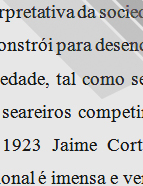

................................
Seara Nova, in which a degree of aristocratism of well-thinking people was evident, fell within the current that sought to develop a rational critique of what exists, a rationality that should prevail even in politics. In fact, the aim of the seareiros was to create intellectual elites to serve as vehicles to transform mentalities (and thus improve governance). Nemo nos conducit (no one leads us) was the excuse for everything to function poorly. Sérgio countered that with profound reforms in all aspects (not just in education), whenever the negative could be transformed into a positive : Ducit (leads). (Sérgio, Essays, II). This was the intention propagandised by Seara Nova so that Portugal could advance on a new path. Finding and preparing competent helmsmen. And in this, Sérgio the essayist and Cortesão the historian were aligned. Through the effort of sustained intellectual work, they sought to transform the country, ensuring that its inhabitants enjoyed another abundance, one generated by work that produced wealth and was rooted in freedom.
Finally, it was the very "spiritual and constructive revolution" to which the seareiros were devoted. (Sérgio, Correspondência [Correspondence], p. 38). Dispelling the ghosts of the past, which they sought to understand and interpret in order to better distance themselves from them, without wishing to return to them b ecause, as Cortesão would confess, "no nation can live perpetually and exclusively on its traditions." It was necessary to start from a grounded historical interpretation "so as not to fall into a narcissistic traditionalism." (Cortesão, At 40). Thus, they sought to combat the "nationalism" that Raul Proença classified as "retrospective and sentimentalist, living off the dead and the memory of the dead, like a kind of necrolatry, leading us to the constant remembrance and commemoration of past glories." (Proença, Pages, IV, p. 17). For the seareiros, on the other hand, history imposed a critical vision and incited a clarifying and reforming prospective for society. And the "most important reform— the preliminary condition of all others—is always the reform of mentality." (Sérgio, in Seara Nova, p. 37). A n ational reform that, according to Raul Proença, should be a "structural, organic modification of our collective life." (Proença, Páginas ..., 2nd series, p. 257) - the purposes and trajectory mercilessly interrupted by the dictatorship .
